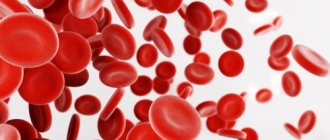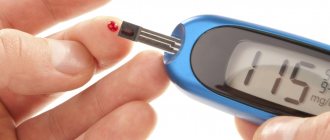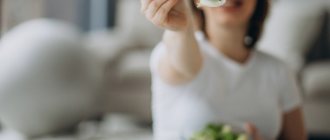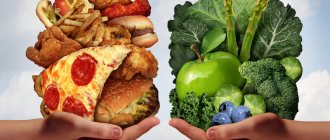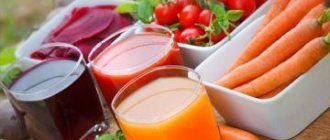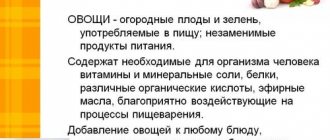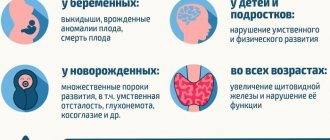Nutrition
What products should I include?
If you follow all the rules of the diet, then keep in mind that you will have to create a menu every week. This is necessary in order to maintain a balance of nutrients in the body. Keep in mind that the daily calorie intake is 2300 kcal .
- Boiled lean meat without skin (turkey, chicken, rabbit, veal);
- Boiled or baked fish (hake, pollock, pike perch);
IMPORTANT: Fish is digested by the body much easier than meat products. Therefore, if you feel uncomfortable eating meat frequently, you can reduce the amount of meat in your diet and increase the amount of fish dishes.
- Boiled and raw vegetables (except for starchy types);
- Berries and fruits with low sugar content (apples, pears, cherries, blueberries, raspberries, etc.);
- Fruit drinks (natural juices, unsweetened compotes);
- Chicken eggs;
- Porridge (oatmeal, millet);
- Products containing soy;
- Low-fat dairy products.
What should you not eat?
- Sweets in any form, including confectionery;
- Sugar;
- Juices in packages and carbonated sweet water;
- Alcohol;
- Butter pastries;
- Wheat bread;
- Fatty meats;
- Fried foods;
- Spicy dishes;
- Pickled products;
- Smoked products.
Recommended Products
A balanced diet to reduce insulin should contain plant and animal foods; fish and seafood are especially beneficial. It is recommended to add nuts and fruits as they contain chromium.
Important! Omega-3 fatty acids contained in fish oil, like flax or pumpkin seeds, have enormous health benefits and are better than other components in reducing insulin and sugar.
It is recommended to include a full list of healthy foods in a diet with elevated blood insulin. They will allow you to create a varied diet for every day:
- Meat of chicken, beef, lamb, free of fat;
- White dietary fish - pike perch, hake, pollock, pike. Fatty red fish. Either form contains many antioxidants and healthy fats, which are highly valuable for health and insulin regulation;
- Whole grain and rye bread without refined white flour;
- Buckwheat or oatmeal, you can add a little wheat and barley to the menu to lower insulin. But if you are overweight, their quantity is strictly regulated;
- Beans, peas, beans and lentils are also healthy and provide a source of plant-based protein, fiber and vitamins;
- It is useful to eat soups and dishes based on secondary broths from fish, vegetables, and meat. Mushroom liquid dishes are allowed, but there should be little potato in such soups;
- Vegetables – the choice is enormous, since almost all low-carb foods are suitable for lowering insulin. These include: radishes and radishes, cabbage and zucchini, as well as pumpkin and squash, eggplant, carrots and cucumbers, peppers, leeks and asparagus;
- A special place in reducing insulin is occupied by green vegetables and herbs - celery, spinach, lettuce, arugula, sweet peppers and peas, artichokes;
- The healthiest fruits are kiwi, green apples, pears and blue fruits, rich in anthocyanins (powerful antioxidants);
- A special place is occupied by garlic, which is effective in the fight against cholesterol;
- Potatoes can be eaten no more than 2 times a week in small portions;
- Sea kale is a low-calorie dietary supplement, a source of iodine and other vitamins, and is especially effective for impaired fat metabolism;
- Fermented milk products with a low fat content, as well as sour cream and cheese up to 30%;
- Fresh berries, as well as mousses and jellies based on them;
- Citrus fruits and avocados also provide health benefits in a diet aimed at lowering insulin levels;
- Natural unrefined oils in an amount of no more than 2 tbsp. l. per day - corn, sea buckthorn, pumpkin, flax and cedar, as well as sesame and walnut oil;
- Honey in strictly limited quantities - no more than 2 tsp;
- Eggs cooked in water or a dry frying pan in the form of an omelet are also beneficial;
- Walnuts and almonds are especially healthy;
- Other nuts can also be included in the diet;
- You can drink some coffee with milk, green tea and herbal infusions;
- It is allowed to consume vegetable juices and berry fruit drinks without sugar.
Among the prohibited foods, anything that is not recommended for proper nutrition is inappropriate. In addition to sugar, smoked and fatty foods, as well as semi-finished products, should be removed from the menu to reduce insulin in the blood. Sausages, snacks and other semi-prepared dishes often contain something that is not stated in the composition. And the body does not need additional preservatives, enhancers and substitutes.
Authorized Products
A diet with elevated blood insulin involves consuming:
- Lean meat and chicken (no skin). They need to be boiled or baked without using fat.
- Dietary fish (hake, pollock, pike perch, cod, navaga pike). Fish is much easier to digest than animal and poultry meat and is rich in protein and amino acids. Pike perch has more protein than chicken. Fish is rich in phosphorus, iodine, magnesium, potassium, vitamins A , E , D. Fatty fish have a high content of fatty acids ( omega-3 , omega-6 ). Salmon and tuna have high nutritional value and should also be included in the diet, consumed boiled or baked.
- Rye bread, whole grain bread, bran bread.
- Croup, the number of which is limited in obesity. It can be millet, pearl barley, barley, but preference is given to buckwheat and oatmeal.
- Legumes - lentils, beans, peas, beans - are sources of protein and fiber, nutrients (minerals, phytoestrogens , omega-3 fatty acids, vitamins) and contain some fat.
- You can consume them several times a week in small portions. Lunch is the best time to eat them. Legumes go well with any vegetables.
- First courses cooked in vegetable or secondary meat broth. It is worth giving preference to vegetable or mushroom soups, since they are lower in calories. Potatoes in soups are allowed in small quantities.
- Vegetables with a low carbohydrate content (lettuce, zucchini, eggplant, cucumbers, pumpkin, squash, cabbage, radish, raw carrots, radishes). Vegetables and greens should be consumed every day in the amount of 400-500 g. Celery and carrots are rich in carotenoids. Green vegetables (peas, spinach, broccoli, peppers, Brussels sprouts, artichokes, leeks, zucchini, Chinese cabbage, green beans, asparagus, celery) and fruits (kiwi, green pears, apples) contain luteins and indoles, which have "anti-oxidant" properties. Blue vegetables and fruits contain anthocyanins, which are antioxidants. Garlic reduces the level of “bad” cholesterol. All vegetables are consumed stewed or raw. Potatoes are recommended in limited quantities.
- Sea kale is a low-calorie product, a source of iodine, vitamins and healthy fiber, which are necessary for impaired lipid metabolism.
- Low-fat fermented milk products, milk and low-fat cottage cheese. They are consumed in their natural form and as part of dishes. Sour cream is allowed in low fat content and only as an additive to dishes; low-fat 30% cheese can be consumed in small quantities.
- Fresh unsweetened berries, in compotes, jellies and mousses. Among fruits, preference is given to citrus fruits and avocados, which are rich in mannoheptulose, which helps lower blood sugar. The high content of protein, potassium, copper and B vitamins makes it indispensable for the nutrition of patients with this pathology. Its neutral taste allows it to be added to any vegetable salads; it goes well with olive oil.
- Various vegetable oils in their natural form (2 tablespoons per day as part of dishes). Of particular value are: cedar; pumpkin, sea buckthorn, avocado, walnut oil; corn, flaxseed, olive, sesame oil, which contain the correct ratio of omega-3 and omega-6 fatty acids.
- Consuming honey up to 2 tsp. in a day.
- Soft-boiled eggs or omelette cooked in water.
- Walnuts in moderation as a source of fiber and alpha-linolenic acid.
- Magnesium, zinc, cobalt and iron have a beneficial effect on blood sugar levels, hematopoiesis and prevent fatty liver. Nuts are rich in iodine, which is necessary for impaired lipid metabolism. Nuts and fruit are a healthy and convenient snack.
- Coffee with milk, green tea, rosehip infusion, vegetable and fruit juices, herbal teas.
Table of permitted products
| Proteins, g | Fats, g | Carbohydrates, g | Calories, kcal | |
Vegetables and greens | ||||
| zucchini | 0,6 | 0,3 | 4,6 | 24 |
| sauerkraut | 1,8 | 0,1 | 4,4 | 19 |
| cauliflower | 2,5 | 0,3 | 5,4 | 30 |
| cucumbers | 0,8 | 0,1 | 2,8 | 15 |
| radish | 1,2 | 0,1 | 3,4 | 19 |
| tomatoes | 0,6 | 0,2 | 4,2 | 20 |
| pumpkin | 1,3 | 0,3 | 7,7 | 28 |
Fruits | ||||
| apricots | 0,9 | 0,1 | 10,8 | 41 |
| watermelon | 0,6 | 0,1 | 5,8 | 25 |
| cherry | 0,8 | 0,5 | 11,3 | 52 |
| pears | 0,4 | 0,3 | 10,9 | 42 |
| nectarine | 0,9 | 0,2 | 11,8 | 48 |
| peaches | 0,9 | 0,1 | 11,3 | 46 |
| plums | 0,8 | 0,3 | 9,6 | 42 |
| apples | 0,4 | 0,4 | 9,8 | 47 |
Berries | ||||
| cowberry | 0,7 | 0,5 | 9,6 | 43 |
| blackberry | 2,0 | 0,0 | 6,4 | 31 |
| raspberries | 0,8 | 0,5 | 8,3 | 46 |
| currant | 1,0 | 0,4 | 7,5 | 43 |
Cereals and porridges | ||||
| buckwheat (kernel) | 12,6 | 3,3 | 62,1 | 313 |
| oat groats | 12,3 | 6,1 | 59,5 | 342 |
| corn grits | 8,3 | 1,2 | 75,0 | 337 |
| pearl barley | 9,3 | 1,1 | 73,7 | 320 |
| millet cereal | 11,5 | 3,3 | 69,3 | 348 |
| barley grits | 10,4 | 1,3 | 66,3 | 324 |
Bakery products | ||||
| Rye bread | 6,6 | 1,2 | 34,2 | 165 |
| bran bread | 7,5 | 1,3 | 45,2 | 227 |
| doctor's bread | 8,2 | 2,6 | 46,3 | 242 |
| whole grain bread | 10,1 | 2,3 | 57,1 | 295 |
Confectionery | ||||
| diabetic crackers | 10,5 | 5,7 | 73,1 | 388 |
Raw materials and seasonings | ||||
| xylitol | 0,0 | 0,0 | 97,9 | 367 |
| honey | 0,8 | 0,0 | 81,5 | 329 |
| fructose | 0,0 | 0,0 | 99,8 | 399 |
Dairy | ||||
| milk | 3,2 | 3,6 | 4,8 | 64 |
| kefir | 3,4 | 2,0 | 4,7 | 51 |
| sour cream 15% (low fat) | 2,6 | 15,0 | 3,0 | 158 |
| curdled milk | 2,9 | 2,5 | 4,1 | 53 |
| yogurt | 4,3 | 2,0 | 6,2 | 60 |
Cheeses and cottage cheese | ||||
| cottage cheese 0.3% | 18,0 | 0,3 | 3,3 | 90 |
Meat products | ||||
| beef | 18,9 | 19,4 | 0,0 | 187 |
| beef tongue | 13,6 | 12,1 | 0,0 | 163 |
| veal | 19,7 | 1,2 | 0,0 | 90 |
| rabbit | 21,0 | 8,0 | 0,0 | 156 |
Bird | ||||
| chicken | 16,0 | 14,0 | 0,0 | 190 |
| turkey | 19,2 | 0,7 | 0,0 | 84 |
Eggs | ||||
| chicken eggs | 12,7 | 10,9 | 0,7 | 157 |
Oils and fats | ||||
| butter | 0,5 | 82,5 | 0,8 | 748 |
| corn oil | 0,0 | 99,9 | 0,0 | 899 |
| olive oil | 0,0 | 99,8 | 0,0 | 898 |
| sunflower oil | 0,0 | 99,9 | 0,0 | 899 |
| ghee | 0,2 | 99,0 | 0,0 | 892 |
Non-alcoholic drinks | ||||
| mineral water | 0,0 | 0,0 | 0,0 | — |
| coffee | 0,2 | 0,0 | 0,3 | 2 |
| instant chicory | 0,1 | 0,0 | 2,8 | 11 |
| black tea without sugar | 0,1 | 0,0 | 0,0 | — |
Juices and compotes | ||||
| plum juice | 0,8 | 0,0 | 9,6 | 39 |
| tomato juice | 1,1 | 0,2 | 3,8 | 21 |
| pumpkin juice | 0,0 | 0,0 | 9,0 | 38 |
| rose hip juice | 0,1 | 0,0 | 17,6 | 70 |
| Apple juice | 0,4 | 0,4 | 9,8 | 42 |
| * data is per 100 g of product | ||||
What foods should you avoid while following a diet?
A high insulin diet involves eliminating the following foods from your diet:
- Diet for knee arthritis. What foods are good and what are bad for arthrosis?
- Jam;
- Jam;
- Cakes;
- Cakes;
- Sweet juices;
- Confectionery with cream;
- Lemonade;
- Sweet glazed cheese curds;
- Semolina;
- Ice cream;
- White rice.
When following a diet, it is recommended to limit salt intake. Fatty meats, marinades, cream, sausages, fried foods, canned food, and hot seasonings should be excluded from the diet.
Smoked meats and spices can stimulate the appetite, causing you to gain extra pounds.
Power value
The diet of people suffering from insulin deficiency or excess has some restrictions. The hardest thing is to start. Strict self-control is required, and for some, a radical change in lifestyle is possible. Please note that the main list of products must be agreed upon with your doctor. In the early stages, insulin instability can be cured using almost non-drug methods, the main thing is that the diet becomes part of everyday life and becomes a habit.
- Increased insulin. Properly selected products that reduce insulin at a high level lead to positive dynamics in the body, namely: weight returns to normal, psychological mood improves, irritability and lethargy go away, the amount of lipids in the blood decreases, the body, receiving nutrients, correctly distributes resources and beneficial properties. Failure to diet will lead to dependence on drug treatment. Also, with an improper diet, severe side effects develop. As a result, complete neglect of the diet can lead to kidney failure, blindness and gangrene.
- Low insulin. Insufficient levels of insulin in the body are no less dangerous than elevated levels. Sugar levels rise rapidly, an incessant feeling of hunger and thirst appears, and urination becomes more frequent, especially at night. Also, the mood and attitude towards the environment changes greatly.
Interesting article: Effective diet for prediabetes: 10 rules for menu planning!
High insulin, leptin, unable to lose weight
Tatiana
April 5, 2020
I will begin to describe the problem from afar. In 2003 (age 10 years), my weight began to increase rapidly. We diagnosed class 1 obesity and found a problem with the thyroid gland - it was enlarged, iodine deficiency, problems with hormones such as TSH and T4. But there were no problems with sugar, twice a year I donated blood for sugar and a glucose tolerance test - everything was within normal limits. For 10 years she was registered with an endocrinologist. At the same time, I was registered with a neurologist for about 2 years due to high blood pressure. In 2013 (age 20), after 4 months of proper nutrition and moderate exercise a couple of times a week, I managed to lose 15 kg (from 72 to 58 with a height of 164 cm). And in the same year, based on the results of tests and ultrasound, I was removed from the endocrinologist’s register, since everything returned to normal. Unfortunately, I can’t say which was the reason - normalization of the thyroid gland helped to lose weight or the absence of extra pounds helped normalize the functioning of the thyroid gland (or maybe this has nothing to do with each other). I weighed 58 kg for about six months. Then the weight fluctuated around 60-62 kg for 4 years. From 2021, in a few months, the weight increased to 69. In 2021, it already reached 72 kg. I can say for sure that during these two years there was a terrible diet - mainly carbohydrates (pasta, potatoes, flour, because finances were difficult, I ate what was easily available), sweets, since there was not enough energy for work - I worked on an irregular schedule (one day after another, one day after another, sometimes two days in a row without sleep). When the situation returned to normal and I began to eat properly and go to training, I already weighed 77 kg with a height of 164 cm (end of 2021, age 26 years). In the first month I lost 4 kg, then 2 kg came back and since then (almost six months) the weight has stayed there and hasn’t gone away. I train regularly, 3 times a week, I also try to maintain proper nutrition, but it doesn’t always work out. The situation is such that sometimes I can’t stop eating, even if I don’t want to, even if it doesn’t taste good, even if I feel nauseous, as if my mind is clouded and I can’t control myself. It seems to me that alcohol and drug addicts feel the same way. In February, I pulled myself together and for a month and a half completely gave up 1. pure sugar, 2. sweets, 3. flour, 4. pasta, 5. alcohol, followed the principles of proper nutrition, and went to training three times a week. As a result, the weight decreased by only 1 kg in 1.5 months (and, as they tell me, this is most likely water). In my opinion, this should not happen and I went to see an endocrinologist. I was prescribed an ultrasound of the thyroid gland and tests, which I took, but did not have time to show to the doctor due to the situation in the country. Results: 1. The ultrasound showed everything was fine, no abnormalities were detected. 2. Tests: 1. TSH – 1.98 (normal – 0.27-4.2) 2. Free T4 – 1.03 (0.8-2.1) 3. Prolactin – 23.8 (6-29 .9) 4. Cortisol – 21.0 (6.2-19.4) 5. Glucose – 5.19 (4.1-5.9) 6. HOMA-IR insulin resistance index – 8.8 (<2.7) 7. Insulin 38.2 (2.6-24.9) 8. Leptin – 49.2 (3.7-11.1) When I saw the results of insulin, I was very scared, and for some reason I lost my mind, although I understand perfectly well, that this, on the contrary, is unacceptable. The question arose - what do the test results say, can any of this contribute to weight gain or difficulties in losing weight? There is a lot of information on the Internet, I decided that it was better to contact a specialist, albeit in absentia. I only understood that the only way out was training and proper nutrition. But why then during the period of compliance with these rules the situation has not changed for the better? And how to cope with attacks of uncontrollable hunger. Are there any medicinal ways to help in this situation? Thank you.
Age:
26
Chronic diseases:
No
The question is closed
obesity
insulin
leptin
General rules
With increased insulin in the blood, the diet includes a number of strict rules that must be followed exactly:
- Restriction on total calories: for men the figure should not exceed 2300 kcal, for women - 1500, for children calorie content ranges from 1200 - 2000, depending on age.
- You need to gradually reduce caloric intake to an acceptable level.
- You can’t eat anything that contains sugar in even the smallest quantities. This applies to everything: tea with sugar, soda, baked goods, any sweets, juices from packages.
- You should also not go hungry for a long time, otherwise the blood glucose level will drop significantly; it is optimal to have a small snack every 2-3 hours, 5-6 meals are enough.
- You need to lead a healthy lifestyle, stop smoking and drinking alcohol
- You should limit drinks containing caffeine, the less often the better, no more than 2-3 times a week
- It is useful to consume low-calorie carbohydrate foods during physical activity to maintain optimal glucose levels, but strenuous exercise is prohibited
- You can no longer eat 2 hours before bedtime
- Salt should be greatly limited, to two grams per day
- Food should only be processed during cooking; it can also be stewed in a small amount of oil; frying is strictly prohibited.
Reviews and results
The diet is quite varied and easy to eat, despite the fact that it includes foods with a low glycemic index. Limiting simple carbohydrates is difficult for some patients to tolerate, but it is necessary to maintain blood sugar and insulin levels within normal limits and helps reduce weight in obesity.
Nutrition should be considered a healthy diet on an ongoing basis and should not be treated as a temporary diet prescribed by a doctor. Switching to a normal diet will immediately cause unwanted changes in the blood. Elevated insulin levels lead to increased cholesterol , fluid and sodium retention, activation of coagulation processes, and increased release of norepinephrine. All this causes the development and progression of atherosclerosis , ischemic heart disease and hypertension.
- “... A 7-year-old child was diagnosed with elevated insulin and normal sugar levels. The doctor said that there is a predisposition to diabetes. 5 years have passed and all these years we have followed the recommendations - restrictions on sweets and flour and mandatory physical activity. Yes, it is difficult to force a child not to eat sweets, cakes and pastries and force him to go to the sports section, but this lifestyle and nutrition is better than diabetes for life. This condition of his also organized us - there are no sweets and other prohibited foods in the house, and we do not eat them either. The benefits are double - for health and weight loss (especially for dad)";
- “... When I began to rapidly gain weight, we discovered an increase in insulin in the blood. They immediately prescribed a diet, saying that the main thing was to lose weight and recommended doing sports. I’m still young and at this age I don’t want to develop diabetes and its complications. I follow a strict diet and monitor my sugar levels at home with a glucometer, and check my insulin at the clinic. I’ve been eating right and going swimming for a year now. The weight is gradually decreasing. You will have to follow such a diet for the rest of your life if you don’t want diabetes”;
- “... Such a diet was prescribed after the examination. The doctor said that positive results will only come when the diet is not a temporary measure, but becomes my permanent diet. I don’t eat sweets, pastries, white bread, potatoes, grapes, dried fruits, bananas, and I started eating less porridge. I eat every 3 hours, but sometimes I still feel hungry. I also started walking 4 km a day. In six months, I reduced my weight by 6 kg - not much, but it is steadily decreasing, sometimes it slows down, and then goes down again.”



